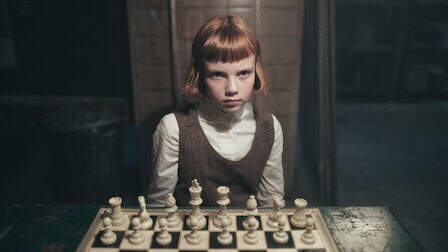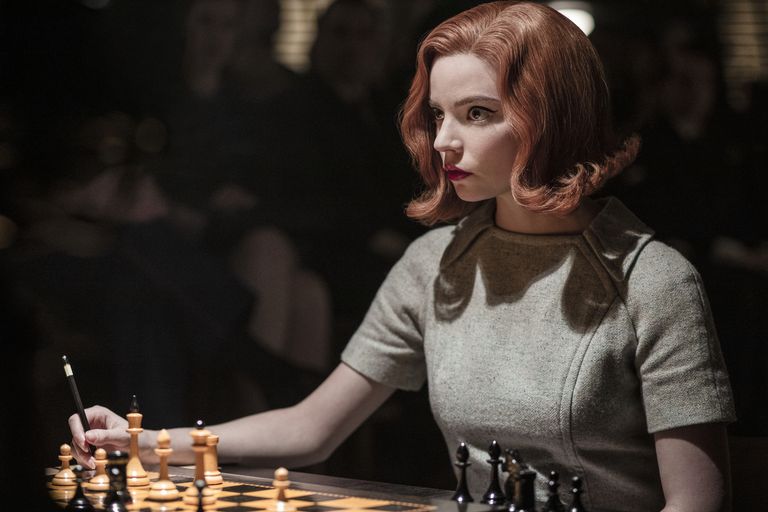[SPOILER ALERT: Plot outcomes from the show are discussed below.]
Much has been written about The Queen’s Gambit on Netflix, and with good reason. It’s an excellent show.
For me, one notable feature was the stories it chose not to tell.
I’m so accustomed to certain plot lines. Each time I realized Queen’s Gambit was sailing right past those, without taking an easy off-ramp, I became more intrigued.
The boozy, pill-popping mother trapped in her own misery, adopting a child? There are so many obvious ways this set-up could go wrong; when the show patiently refused to explore any of them, I realized, This show has a better story to tell.
I thought the same thing about the various boys and men who interacted with the troubled chess genius Beth Harmon on her unlikely ascent to greatness. I kept expecting standard types of conflict — sexual assault; unrequited love which turns into bitterness or revenge; the jealous urge to control or even stymie her greatness because it may eclipse his. When Queen’s Gambit failed to turn down any of those paths, my curiosity mounted.
How refreshing to realize a new story is being told, or perhaps an ancient one, being re-told at just the right moment, in just the right way.
What then is the story which Queen’s Gambit waits so patiently to tell?
[SPOILER ALERT: Plot outcomes are discussed below.]
The answer is different, of course, for each watcher. But for me, the show is about the difficulty of being both a genius and a girl. Yes, layers of further difficulty are added on top of that; Beth is an orphan and a drug addict, and she is growing up in the United States, which in the 1950s and ’60s was a chess backwater. But when I boil it down — when I try to pinpoint why I was so moved and entranced — it’s the struggle of a girl whose gifts set her apart, sometimes painfully so. The girl feels this greatness inside her. She is by turns scared of it, amazed by it, fascinated by it, angry at it, and so on. The show is the evolution of her relationship to that gift. It’s a love story not between her and a boy, but between her and the game of chess, between her and her own genius. There are early, unsatisfactory experiences kissing boys or sleeping with them. But the true passion is reserved for trance-like visions of a chess board on the ceiling of her bedroom, the pieces moving themselves, the game revealing itself to her at warp speed.
Along the way, while watching this show, I kept thinking, It’s not easy for this kid. I didn’t always like her, I was occasionally frustrated by her decisions. But I was always, always rooting for her.
In the show’s final episode, I was crying from the bulletin-board scene onward. The gradual reappearance of all the boys and men she’d encountered along the way — the fact that they were supporting her, cheering for her, praying for her — well, I was moved. I appreciated very much this model of masculinity, a model perhaps more aspirational than realistic, but nonetheless stirring.
Two characters, in particular, illustrated for me what true strength, kindness, and masculinity look like — the shaggy, gray-haired Russian champion whose eyes sparkle and whose heart opens when he sees that Beth has recovered her footing and will beat him; and the daunting, handsome, ultra-disciplined Russian world champion who faces Beth in her final match.
How these two men behave in defeat contrasts beautifully with the way a certain high-profile American is dealing with his own very public loss right now. In my view, these fictional Russians behave exactly as we should teach boys in real life to behave, whether playing chess or ice hockey, sitting in a classroom, dating someone, or whatever else.
In defeat, the Russian masters lay down their pride and self-regard, open their hearts, and smile at the supernova exploding in front of them. They step back and give the full measure of recognition and respect to the troubled girl who brought it forth. They are moved by the beauty and power of her game. They understand it not only eclipses their own achievements, but that it illustrates, for a moment at least, the mysteries of the universe, the full expression of an exquisite mind. They are honored to be part of her story.
There are other things to like about the show. Wardrobe and art direction are superb. And the storytelling illustrates vividly that the difficulty of the struggle — the extent to which the deck seems heavily stacked against the hero — also builds the strength which makes the final push possible. Beth’s route to success isn’t one which anybody would draw up ahead of time. There are crucial mistakes, moments of heartbreaking self-sabotage. But she gradually develops the strength and discipline to stay in the pocket and stare down the final opponent.
She may not be the hero we were expecting — an odd, brusque girl who sees chess games unfolding on her bedroom ceiling — but she feels like the hero we need. She is single-minded, proud, aggressive, fearless, and so much stronger, way down deep in her soul, than her slender frame may initially suggest.
Finally, as exceptional as Beth’s chess skills are, it’s worth considering, too, that all of us havea sliver of genius inside us. Indeed, part of the life journey is to discover what one is good at, to work at it, and then to offer it to others.
If this is true, then it also stands to reason that, like the Russian chess masters — with their impeccable manners, their deep respect for the game, their unexpected kindness to the young American woman — we should try, when interacting with anyone at all, to discern and focus on the person’s sliver of genius, not their flaws, weakness, or illness. In this way a girl is nudged toward the greatness which is her birthright.
Genius wants so desperately to be born. We should do whatever we can to protect and nourish it. And when it does burst forth, we should stop dead in our tracks, bear collective witness, and applaud like crazy. We should give sincere thanks. That is the proper response, even if we ourselves may sit on the losing side of the table.



